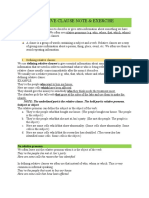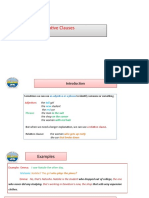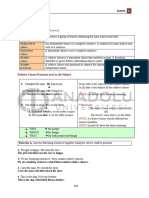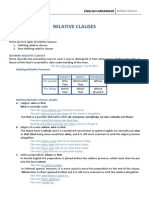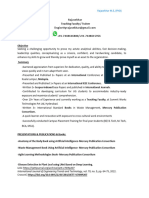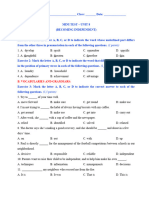Relative Clauses
Relative Clauses
Uploaded by
Esranur GürgenCopyright:
Available Formats
Relative Clauses
Relative Clauses
Uploaded by
Esranur GürgenOriginal Title
Copyright
Available Formats
Share this document
Did you find this document useful?
Is this content inappropriate?
Copyright:
Available Formats
Relative Clauses
Relative Clauses
Uploaded by
Esranur GürgenCopyright:
Available Formats
RELATIVE CLAUSES
Defining Relative Clauses
We use defining relative clauses to say exactly which person or thing we are talking about. We
do not give extra information in this type of relative clauses, so without relative clause, the
sentence will not be meaningful.
Relative word Function Example
Used to talk about He was the man who/that bought my house.
Who/that
people (‘Verb’ comes after ‘who’)
Used instead of
‘who’ or ‘that’ as
the object of the She was a woman whom I greatly respected.
Whom
verb in the relative (‘Subject’ comes after ‘whom’)
clause (in formal
English)
Used to indicate The child whose mother had left him was crying
Whose
possession loudly.
Used to talk about The car which/that crashed into me belonged to
Which/that
things or places Sally.
Where/that
(Where means The building where he lives is very old.
‘in which’ or The building in which he lives is very old.
‘at which’) Used to talk about The building which he lives in is very old.
places The building that he lives is very old.
! Look at the
tips given
below.
Used to talk about
When This is the year when profits should increase.
time
Usually we do not use ‘that’ and ‘who’ with prepositions before them. We use
‘preposition + whom/which’.
• These are the people to whom Catherine was talking.
• The chair on which I was sitting broke down.
‘That’, ‘who’, ‘which’ as the SUBJECT of the clause
• The woman who/that lives next door is very friendly.
Subject of the clause
• The car which/that caused the accident drove off.
Subject of the clause
Prepared and Compiled by Çiğdem Kayıhan Aslan Page 1
‘That’, ‘who’ and ‘which’ as the OBJECT of the clause
• The woman who/that you met yesterday lives next door.
Object (You met the woman)
• The car which/that I wanted to buy was not for sale.
Object (I wanted to buy the car)
You can OMIT the relative pronoun ‘who’, ‘which’, ‘that’ and ‘where’ in
Defining Relative Clauses if the relative clause is the OBJECT of the
sentence. You cannot omit ‘whose’:
• The woman who/that you met yesterday lives next door.
• The woman you met yesterday lives next door.
• The car which/that I wanted to buy was not for sale.
• The car I wanted to buy was not for sale.
• The neighbourhood where I grew up was small.
• The neighbourhood I grew up was small.
Tips in differentiating ‘where’ and ‘which’ when we talk about places
• When we talk about qualities of ‘places’ just like we talk about the qualities of
‘things’, we use ‘which’, not ‘where’:
This is the garden which is full of colours.
This is the book which is full of stories.
This is the garden where/to which we go at the weekends. (not a quality,
what people do in the garden is explained)
• After ‘where’ we always use a ‘subject’ (pronoun/noun) because relative clause with
‘where’ is never the ‘subject’ of a sentence, whereas after ‘which’, we can use a
‘subject’ or a ‘verb’ because relative clause with ‘which’ can be both the ‘subject’ and
the ‘object’ of the sentence.
This is the library where I borrow books. (Relative clause is the object)
This is the library which I like very much. (Relative clause is the object)
This is the library which is nice. (Relative clause is the subject)
Prepared and Compiled by Çiğdem Kayıhan Aslan Page 2
Non-Defining Relative Clauses
We use non-defining relative clauses to give extra information about the person or thing we are
talking about. Without the relative clause, the sentence will still be meaningful. We use a
comma before and after the relative clause. We do not use ‘that’ and we do not omit the relative
pronoun in non-defining relative clauses.
Relative word Function Example
Used to talk about Professor Marvin, who teaches Biology, is an
Who
people excellent lecturer. (‘Verb’ comes after ‘who’)
Used instead of
‘who’ or ‘that’ as
the object of the She was engaged to a sailor, whom she had met at
Whom
verb in the relative Dartmouth. (‘Subject’ comes after ‘whom’)
clause (in formal
English).
Used to indicate Marilyn Monroe, whose real name was Norma
Whose
possession Jean, was born in Los Angeles.
Hawaii, which consists of eight principal islands,
is a popular vacation spot.
Used to talk about
Which (Remember the tips for differentiating ‘which’
things or places
and ‘where’- similar example: This meal, which
includes eight ingredients, is very delicious.)
Where Used to talk about She has just come back from a holiday in Crete,
places. where Alex and I went last year.
Used to talk about
When This happened in 1957, when I was still a baby.
time.
‘Who’ or ‘which’ as the SUBJECT of the clause
• Heath Robinson, who died in 1944, was a graphic artist and cartoonist.
Subject of the clause
• I am teaching at the Selly Oak centre, which is just over the road.
Subject of the clause
‘Who’ and ‘which’ as the OBJECT of the sentence
• I was in the same group as Alice, who(m) I like a lot.
Object
• He was a man of considerable wealth, which he ultimately spent on his experiments.
Object
Prepared and Compiled by Çiğdem Kayıhan Aslan Page 3
EXERCISE 1- Fill in the blanks using relative pronouns and put a tick next to the
sentences in which the relative pronoun can be omitted.
1. The Campus ______________ I study is really good.
2. The University ______________ I visited yesterday is a well-known one.
3. The woman ______________ I met was my friend’s mother.
4. The girl ______________ wallet was lost was crying.
5. That is the girl ______________ fell down yesterday.
6. That is the young man to ______________ I spoke.
7. The job for ______________ she’s applied is in Paris.
8. The neighbourhood ______________ I grew up in was very friendly.
9. The neighbour ______________ children watered our plants lives across the street.
10. Let’s try to agree on a time ______________ we can all get together.
EXERCISE 2- Complete the sentences with relative clauses so that they have the same
meaning with the sentences given above them.
1. Jack made a table. It’s not very strong.
The table ____________________________ is not very strong.
2. I read about a new computer. I had seen it on TV.
I read about the new computer ____________________________.
3. Jane made a cake. Nobody liked it.
Nobody liked the cake ____________________________.
4. My sister wrote an article. The newspaper is going to publish it.
The newspaper is going to publish the article ____________________________.
5. I have been to India. Women wear a traditional dress called saree there.
I have been to India ____________________________
6. Mary sent me a letter. It was very funny.
The letter ____________________________ was very funny.
7. I met an old lady. She was one hundred and three years old.
The old lady ____________________________ was one hundred and three years old.
8. I saw a house. My brother wants to buy it.
I saw the house ____________________________.
9. I went to a country. It had an amazing cuisine.
I went to a country ____________________________.
10. I talked to a teacher. Her all students passed the exam.
I talked to the teacher ____________________________.
11. My mother works in a factory. It makes parts for cars.
The factory ____________________________ makes parts for cars.
12. We ran out of petrol in a little village. It didn’t have a petrol station.
The village ____________________________ didn’t have a petrol station.
13. The hotel had a magician. He was very talented.
The hotel had a magician ____________________________.
Prepared and Compiled by Çiğdem Kayıhan Aslan Page 4
14. The workers are paid a salary. They can’t live on it.
The workers can’t live on the salary ____________________________.
15. Sharon’s got a new mobile. It takes good photos.
Sharon’s got a new mobile ____________________________.
EXERCISE 3- Make a non-defining relative clause from these sentences.
1. The polar bear is a large bear that lives in the Arctic. It is also known as the white bear.
___________________________________________________________________________
2. Peter is studying French and German. He has never been abroad.
___________________________________________________________________________
3. We are moving to Manchester. Manchester is in the north-west of England.
___________________________________________________________________________
4. I’ll be staying with Adrian. His brother is one of my closest friends.
___________________________________________________________________________
5. Madonna’s parents were born in Italy. She is a famous American singer.
___________________________________________________________________________
6. The Queen of England lives in the Buckingham Palace. The Buckingham Palace is the
centre of London.
___________________________________________________________________________
7. Many tourists go to Paris. I met my boyfriend in Paris.
___________________________________________________________________________
8. The school was built in 1907. The school has about 800 students.
___________________________________________________________________________
9. The Plaza Redonda square is near the cathedral. There is a market in The Plaza Redonda
square every Sunday.
___________________________________________________________________________
10. Samantha is coming to the party. Samantha's mother is the mayoress of this town.
___________________________________________________________________________
Prepared and Compiled by Çiğdem Kayıhan Aslan Page 5
EXERCISE 4- Fill in the blanks using relative pronoun in each space.
John Lennon, (1) __________ was born in 1940, was a member of the Beatles, the British rock
group. He grew up in Liverpool, (2) __________ he performed in a number of groups, and met
the other members of the Beatles. After studying at art college, (3) __________ he disliked as
much as he had disliked school, Lennon spent his time learning to be a musician. In 1962, the
Beatles had their first hit record, (4) __________ was soon followed by success in the USA.
Lennon met Paul McCartney in 1957 and they wrote most of the group's songs together. The
success of the Beatles, (5) __________ was worldwide, created problems for Lennon, (6)
__________ often said exactly what he thought to be the press and TV, and got into trouble.
By the time the Beatles stopped working together, what came about during the late 1960s,
Lennon's songs had become both political and highly personal. His personal life, (7)
__________ became more difficult because of his drug and alcohol addiction, was also often
in the news. He and his wife Cynthia were divorced, and he married Yoko Ono, with (8)
__________ he carried out political protests. They also made records together, and went to live
in the USA, (9) __________ Lennon continued his solo career. They also made records
together, and went to live in the USA and continued his solo career. In the mid 70s he took a
break from music. In 1980 (10) __________ he was working on a new album, he was shot dead.
Prepared and Compiled by Çiğdem Kayıhan Aslan Page 6
You might also like
- Relative ClausesDocument12 pagesRelative ClausesTấn DũngNo ratings yet
- 1.relative Clauses PPT Teoria - EsencialDocument28 pages1.relative Clauses PPT Teoria - EsencialjoloalNo ratings yet
- Relative ClausesDocument28 pagesRelative ClausesMeyke Jayanti KinasihNo ratings yet
- Modul 1Document28 pagesModul 1Anonymous HWsv9pBUhNo ratings yet
- Relative Clause NoteDocument7 pagesRelative Clause NoteFriska WijayaNo ratings yet
- Relative ClausesDocument18 pagesRelative ClausesGemma CastilloNo ratings yet
- 1 Alberto Relative Clauses TheoryDocument2 pages1 Alberto Relative Clauses Theoryyvonne carlileNo ratings yet
- Relative Clauses 3º Eso E IES Isaac PeralDocument21 pagesRelative Clauses 3º Eso E IES Isaac PeralMaría Jiménez MijánNo ratings yet
- Elative Lauses: Explaining English GrammarDocument20 pagesElative Lauses: Explaining English Grammarhaymanot aNo ratings yet
- NEW GRAMMAR TIME 5 - Unit 17 - Relative clausesDocument40 pagesNEW GRAMMAR TIME 5 - Unit 17 - Relative clausesNguyễn Hồng MâyNo ratings yet
- Relative ClauseDocument22 pagesRelative Clauselookmoo50No ratings yet
- Relative Clause PresentationDocument23 pagesRelative Clause PresentationMaria Jose CarrascoNo ratings yet
- HTTPSWWW Edu Xunta Galcentrosiesbeadeq systemfilesRelative20Pronouns PDFDocument6 pagesHTTPSWWW Edu Xunta Galcentrosiesbeadeq systemfilesRelative20Pronouns PDFpilar.camposvergara.2007No ratings yet
- Adjective ClausesDocument16 pagesAdjective ClausesEstefane Abigail OyNo ratings yet
- Lecture 11 Relative Clauses (Introduction)Document13 pagesLecture 11 Relative Clauses (Introduction)Sjumx SecretNo ratings yet
- Topic:2 Parts of SpeechDocument18 pagesTopic:2 Parts of SpeechVIMAL NAIR SURESHNo ratings yet
- Relative Pronoun: Nounadj Noun Adj ClauseDocument5 pagesRelative Pronoun: Nounadj Noun Adj Clauseaprilia lailatul mubarokahNo ratings yet
- Relative ClausesDocument4 pagesRelative ClausesRoxana BalcescuNo ratings yet
- Relative ClausesDocument3 pagesRelative ClausesElisaZhangNo ratings yet
- English GR - DeterminersDocument8 pagesEnglish GR - DeterminersAvani gupta [VII-C] [7] [1 1 4 7 8]No ratings yet
- Relative PronounDocument6 pagesRelative PronounpadilhalaurajiNo ratings yet
- Relative Clauses Grammar Guides 140856Document16 pagesRelative Clauses Grammar Guides 140856Roberta OrlandoNo ratings yet
- Relative - Pronouns - 11º Rules Exercises Students Version 2024Document3 pagesRelative - Pronouns - 11º Rules Exercises Students Version 2024tichaaNo ratings yet
- POSSESIONSDocument16 pagesPOSSESIONSirielvelazquezdiazNo ratings yet
- Understandingpronouns 200707102021Document34 pagesUnderstandingpronouns 200707102021Fausto VilemaNo ratings yet
- Relative Clauses: Proficiency Course in English/ Faculty of Law Level 4 2020/2021 DeltDocument12 pagesRelative Clauses: Proficiency Course in English/ Faculty of Law Level 4 2020/2021 DeltMilani MullevidanaNo ratings yet
- Relative ClausesDocument11 pagesRelative Clausesmariainesmurua.chNo ratings yet
- Unit 2. Relative Clause. Theory and ExercisesDocument10 pagesUnit 2. Relative Clause. Theory and Exercisesizasbj100% (1)
- Adjective Clause and Its KindsDocument25 pagesAdjective Clause and Its KindsalisinaalipoorNo ratings yet
- RelativeclausesDocument6 pagesRelativeclausescristinadinca389No ratings yet
- Relative Infinitive ClausesDocument11 pagesRelative Infinitive ClausesNguyên HồNo ratings yet
- Relative ClausesDocument18 pagesRelative ClausesNgan PhamNo ratings yet
- Units 7-12 GR 12 Summarised Text BookDocument23 pagesUnits 7-12 GR 12 Summarised Text BookKedir MohammedNo ratings yet
- Types of PronounsDocument74 pagesTypes of PronounsRamirez Ram AngeloNo ratings yet
- Unit 8 - GrammarDocument11 pagesUnit 8 - GrammarHong PhucNo ratings yet
- Pronouns: I, Me, You EtcDocument12 pagesPronouns: I, Me, You EtcEva.lineNo ratings yet
- Relative ClausesDocument16 pagesRelative ClausesAna GallardoNo ratings yet
- Supplementary Pack-Unit 8 Answer KeyDocument11 pagesSupplementary Pack-Unit 8 Answer KeyBetran WinowodaNo ratings yet
- Functional English 3. Pronoun and Its TypesDocument21 pagesFunctional English 3. Pronoun and Its Typessawerarahim456No ratings yet
- Clauses: by Asep Saepuloh, S.S., M.PDDocument16 pagesClauses: by Asep Saepuloh, S.S., M.PDRifa Nur AliaNo ratings yet
- Ad Jadv CS10 2020 (Autosaved)Document38 pagesAd Jadv CS10 2020 (Autosaved)Berylz RafiNo ratings yet
- English WarmDocument3 pagesEnglish WarmNataly BarcenasNo ratings yet
- Relative ClauseDocument4 pagesRelative ClausejansetNo ratings yet
- English Grammar Lessons (By Anselm Shiran)Document4 pagesEnglish Grammar Lessons (By Anselm Shiran)piyalfdo123No ratings yet
- Relative Adjective ClauseDocument6 pagesRelative Adjective ClauseMaria QuinteroNo ratings yet
- Relative Clauses: English GrammarDocument10 pagesRelative Clauses: English GrammarDr MontyNo ratings yet
- Relative Clauses - 10 AnoDocument10 pagesRelative Clauses - 10 AnoAna Sofia SantosNo ratings yet
- Relative ClausesDocument12 pagesRelative ClausesElijah Adjei BoakyeNo ratings yet
- Pronoun (Diva&wilda)Document16 pagesPronoun (Diva&wilda)lauranuraini05No ratings yet
- GrammarDocument203 pagesGrammarIvan StankovićNo ratings yet
- Adjective ClauseDocument13 pagesAdjective ClauseLeo PardedeNo ratings yet
- Relative ClausesDocument11 pagesRelative Clausessaeed100% (2)
- English V Guide 2 (Weeks 4-5)Document7 pagesEnglish V Guide 2 (Weeks 4-5)Edwin Guerrero CRNo ratings yet
- PossessivesDocument9 pagesPossessivesMaju ToledoNo ratings yet
- Relative ClausesDocument19 pagesRelative ClauseskareenstefaniaaNo ratings yet
- HomonnymsDocument23 pagesHomonnymsTiffany EcclesNo ratings yet
- Relative ClausesDocument14 pagesRelative ClausesTiara WulandariNo ratings yet
- Unit 1 - Reference WordsDocument7 pagesUnit 1 - Reference WordsJeisy Veas ZepedaNo ratings yet
- Clauses: Identifying Adjective, Adverb, and Noun Clauses in A SentenceDocument45 pagesClauses: Identifying Adjective, Adverb, and Noun Clauses in A SentenceShravani IngaleNo ratings yet
- Webster's Word Power Essential Students' Companion: General Knowledge of the English LanguageFrom EverandWebster's Word Power Essential Students' Companion: General Knowledge of the English LanguageNo ratings yet
- International Wound Journal - 2024 - Qian - Complications and Psychological Impact of Pressure Ulcers On Patients andDocument11 pagesInternational Wound Journal - 2024 - Qian - Complications and Psychological Impact of Pressure Ulcers On Patients andEsranur GürgenNo ratings yet
- 5 - The Hidden Power of SmilingDocument3 pages5 - The Hidden Power of SmilingEsranur GürgenNo ratings yet
- My Daily Routine MaterialDocument3 pagesMy Daily Routine MaterialEsranur GürgenNo ratings yet
- Ted Talk 6Document3 pagesTed Talk 6Esranur GürgenNo ratings yet
- Answer Key To Relative Clauses'Document1 pageAnswer Key To Relative Clauses'Esranur GürgenNo ratings yet
- Talk About Yourself MaterialDocument2 pagesTalk About Yourself MaterialEsranur GürgenNo ratings yet
- Story Completion-2Document1 pageStory Completion-2Esranur GürgenNo ratings yet
- Trigonometri czm1Document61 pagesTrigonometri czm1Esranur GürgenNo ratings yet
- Subject Verb Agreement ExerciseDocument5 pagesSubject Verb Agreement ExerciseEsranur GürgenNo ratings yet
- FrankensteinDocument79 pagesFrankensteinEsranur GürgenNo ratings yet
- Yazma Sinavi Ornegi Ve Degerlendirme OlcutleriDocument3 pagesYazma Sinavi Ornegi Ve Degerlendirme OlcutleriEsranur GürgenNo ratings yet
- LmfitDocument117 pagesLmfitVíctor KNo ratings yet
- Tour Guide Job and TaboosDocument5 pagesTour Guide Job and TaboosPreotescu IuliaNo ratings yet
- Resume Rajasekhar LingisettyDocument4 pagesResume Rajasekhar LingisettyAdmin DigiepitomeNo ratings yet
- Future Forms ExercisesDocument2 pagesFuture Forms Exerciseskastemania100% (3)
- 02 G7 Division-IntegersDocument12 pages02 G7 Division-IntegersRicky DpusoyNo ratings yet
- Paper Title (Use Style: Paper Title) : Subtitle As Needed (Paper Subtitle)Document4 pagesPaper Title (Use Style: Paper Title) : Subtitle As Needed (Paper Subtitle)Agung SuryaputraNo ratings yet
- Powerview 3.0 Generic Tables and Fields Page 1 of 7: Field Name Field Description Data Type Relationship ClientsDocument7 pagesPowerview 3.0 Generic Tables and Fields Page 1 of 7: Field Name Field Description Data Type Relationship ClientsNéstor Raúl Pineda JaraNo ratings yet
- Running Oracle EBS in The CloudDocument60 pagesRunning Oracle EBS in The Cloudrohit kumarNo ratings yet
- ( (Đề) G11 - U8Document3 pages( (Đề) G11 - U8Phan Khanh Huyen (FE School HPG)No ratings yet
- Alogrithms and Data Structure SyllabusDocument7 pagesAlogrithms and Data Structure SyllabusJoshua CheungNo ratings yet
- Venu ResumeDocument3 pagesVenu ResumevenuNo ratings yet
- Linear and Non-LinearDocument17 pagesLinear and Non-LinearVictor John Cayanan AnunciacionNo ratings yet
- Math Talks - What's Missing - (Zorbit)Document22 pagesMath Talks - What's Missing - (Zorbit)Calin BNo ratings yet
- English Vocabulary Exercises For B2 - Life Events - English Practice OnlineDocument12 pagesEnglish Vocabulary Exercises For B2 - Life Events - English Practice Onlinegiangpopper2No ratings yet
- Book Title: Author NameDocument19 pagesBook Title: Author NameJuan R. Rodríguez SantanaNo ratings yet
- Universal Grammar Approaches: in First Language AcquisitionDocument6 pagesUniversal Grammar Approaches: in First Language AcquisitionMark Vincent Z. PadillaNo ratings yet
- Network Fundamentals and ProtocolsDocument61 pagesNetwork Fundamentals and ProtocolsVim SamNo ratings yet
- ACCC4006 Software DevelopmentDocument18 pagesACCC4006 Software DevelopmentDiana IagarNo ratings yet
- Lesson Plan Five - Nature PoetryDocument6 pagesLesson Plan Five - Nature Poetryapi-323577556No ratings yet
- Autism Spectrum DisorderDocument8 pagesAutism Spectrum DisorderJechsa De GuiaNo ratings yet
- Lesson 1 and 2 QuizDocument2 pagesLesson 1 and 2 QuizJaqueline Quizon BatallerNo ratings yet
- ESP A.P English MTB Math Filipino Mapeh (P.E) : GRADES 1 To 12 Daily Lesson LogDocument8 pagesESP A.P English MTB Math Filipino Mapeh (P.E) : GRADES 1 To 12 Daily Lesson Logenimsay somarNo ratings yet
- A Story About The BodyDocument3 pagesA Story About The BodyDennis Karanja100% (1)
- SCHOOL DIARY 2021-2022 List of Holidays and EventsDocument8 pagesSCHOOL DIARY 2021-2022 List of Holidays and EventszkhksfhiNo ratings yet
- 1Q Curriculum Map English Grade 9 2014-2015 RevisedDocument8 pages1Q Curriculum Map English Grade 9 2014-2015 RevisedRoger FloresNo ratings yet
- REVISION PLAN - CLASS X ENGLISHDocument4 pagesREVISION PLAN - CLASS X ENGLISHannbu2026No ratings yet
- The Therapist's Self in Dialogical Family TherapyDocument19 pagesThe Therapist's Self in Dialogical Family Therapypekana74No ratings yet
- Problems On Trains - Aptitude Questions and AnswersDocument3 pagesProblems On Trains - Aptitude Questions and Answersরোহন করNo ratings yet
- 20 Digital Language Translation Tools and Their BenefitsDocument14 pages20 Digital Language Translation Tools and Their Benefitsmaha souraniNo ratings yet
- Present Simple and Past ParticipleDocument41 pagesPresent Simple and Past ParticipleLaura ColcheroNo ratings yet




